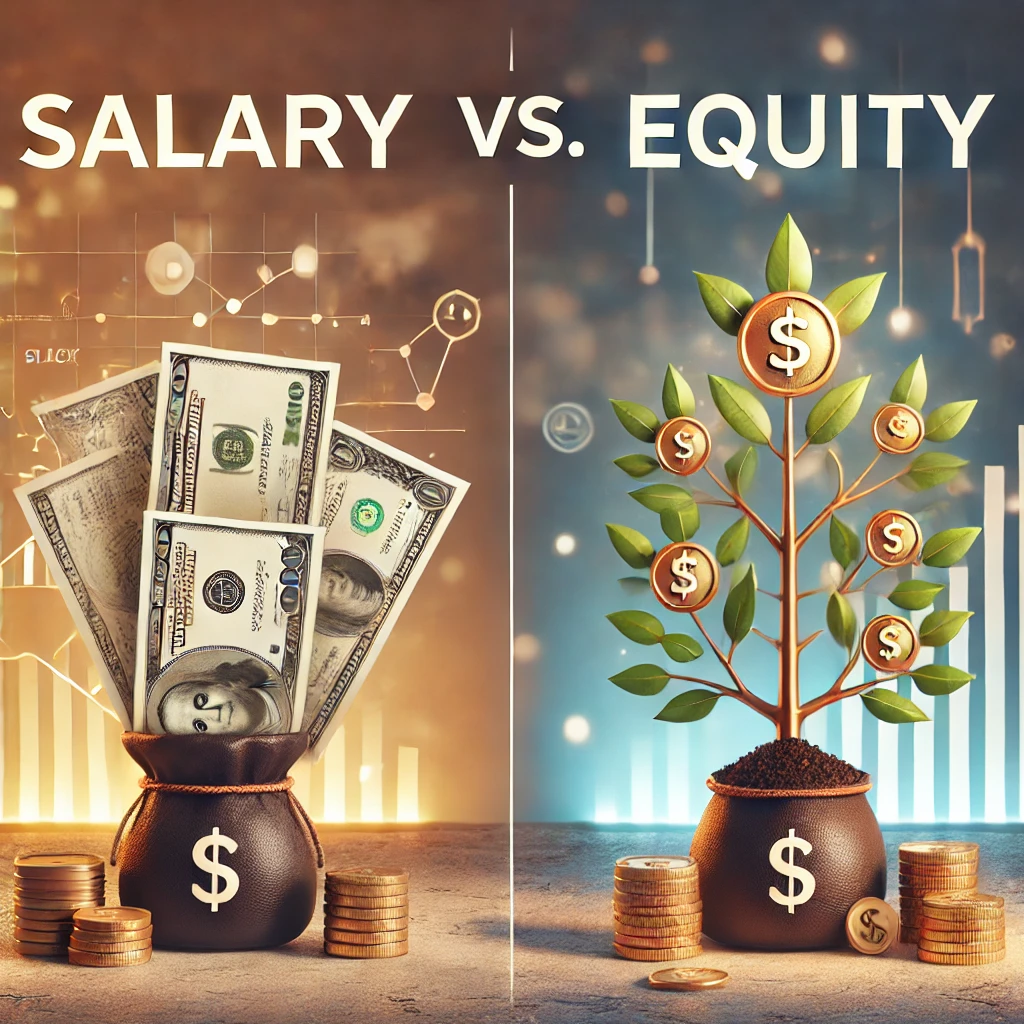Salary vs. Equity What’s the Best Choice in Tech Compensation?
Explore the pros and cons of salary and equity in tech compensation packages, and learn how to make the best decision for your financial future.
Post last updated: December 25, 2024

Salary vs. Equity: What’s the Best Choice in Tech Compensation?
Working in tech often comes with unique compensation packages that include a mix of salary and equity. But how do you decide which is better for you? Should you choose the steady reliability of a salary or bet on the potential payoff of equity? Let’s break it down in simple terms to help you make the right choice.
What’s in a Tech Compensation Package?
Tech companies offer more than just a paycheck. Here’s what’s typically included in your package:
Base Salary
Your base salary is your fixed income. It’s guaranteed and paid regularly, making it the simplest and most stable part of your compensation.
Equity
Equity is ownership in the company, and it usually comes in two main forms:
- Stock Options: These allow you to buy shares of the company at a fixed price in the future. If the company grows, you profit from the increased value.
- Restricted Stock Units (RSUs): These are shares given to you, often with a “vesting” schedule that determines when you fully own them.
Bonuses
Bonuses are additional payments tied to performance—yours, your team’s, or the company’s overall success.
Benefits
Tech companies often include perks like health insurance, retirement plans, wellness stipends, and even stock purchase plans.
Why Equity Feels Like a Jackpot
Equity often feels like a golden ticket, especially in fast-growing tech companies. But is it really? Let’s explore the benefits and risks.
The Upside of Equity
- Potential for Big Returns: If your company succeeds, your equity’s value can skyrocket, sometimes far surpassing what a salary could provide.
- Feeling of Ownership: Equity connects your success with the company’s success, making your work feel more meaningful.
- Tax Advantages: Depending on how it’s structured, equity may be taxed at lower rates than regular income.
The Risks of Equity
- Uncertain Value: If the company underperforms, your equity could end up being worth nothing.
- Delayed Access: In private companies, you might not be able to sell your equity until the company goes public or is acquired.
- Complexity: Understanding stock options, RSUs, and their tax implications can be confusing.
The Case for Salary
A salary is straightforward and reliable, providing stability that equity often lacks.
The Benefits of Salary
- Predictability: A steady paycheck ensures you can cover your expenses and save consistently.
- Immediate Cash Flow: Unlike equity, you don’t have to wait years to see the benefits.
- Freedom to Invest: With cash in hand, you can invest in other areas like stocks, real estate, or retirement accounts.
Key Questions to Ask Before Deciding
When faced with a mix of salary and equity, take the time to evaluate the offer carefully. Here are some important questions:
-
How Does the Equity Vest?
- Does it vest gradually over time, or all at once? If you leave early, how much do you forfeit?
-
What’s the Company’s Current Situation?
- Is it financially stable? For startups, is there a realistic path to growth or profitability?
-
Can You Sell the Equity?
- If it’s a private company, you might not be able to cash out until the company goes public or is acquired.
-
What Are the Tax Implications?
- Some equity types come with significant tax responsibilities. Make sure you understand them.
-
How Does the Total Package Add Up?
- Compare the combined value of salary, equity, bonuses, and benefits. A lower salary might be offset by high-growth equity—or not.
Balancing Salary and Equity
The right mix depends on where you are in your career and what matters most to you:
For Early-Career Professionals
Prioritize salary for stability while building financial security. Equity is a nice bonus but shouldn’t be your primary focus.
For Mid-Career Professionals
If you’ve built savings, you might be ready to take on more risk. Equity-heavy packages could pay off if the company succeeds.
For Late-Career Professionals
Stability is key. Focus on higher salaries and secure benefits to protect your financial future.
A Practical Example
Imagine you’re offered two packages:
Package A
- $120,000 salary
- No equity
Package B
- $100,000 salary
- $50,000 in equity
At first, Package B might seem better because of the added equity. But consider:
- Is the Equity Risky? If the company fails, the equity might become worthless.
- Can You Afford the Lower Salary? A $20,000 pay cut might strain your budget.
If you value stability, Package A could be better. But if you believe in the company and can handle the risk, Package B might be worth it.
Tips for Making the Right Choice
- Do Your Homework: Research the company’s financial health and future prospects.
- Get Expert Advice: A financial planner can help you understand the implications of equity and taxes.
- Negotiate Your Offer: If the equity feels risky, ask for a higher salary or better benefits.
- Diversify Your Investments: Don’t put all your financial eggs in one basket.
- Think Long-Term: Choose a package that aligns with your personal and financial goals.
The Final Word
Choosing between salary and equity doesn’t have to be overwhelming. Salary provides stability and immediate value, while equity offers the chance for greater rewards but comes with risks.
The best decision depends on your unique situation. By understanding the details and asking the right questions, you can make a choice that sets you up for financial success. Whether you play it safe with a salary or take a chance on equity, aligning your compensation with your goals is the smartest move you can make.
Have questions or need support? Feel free to reach out to us!
Email: admin@fincalci.com
Author:





